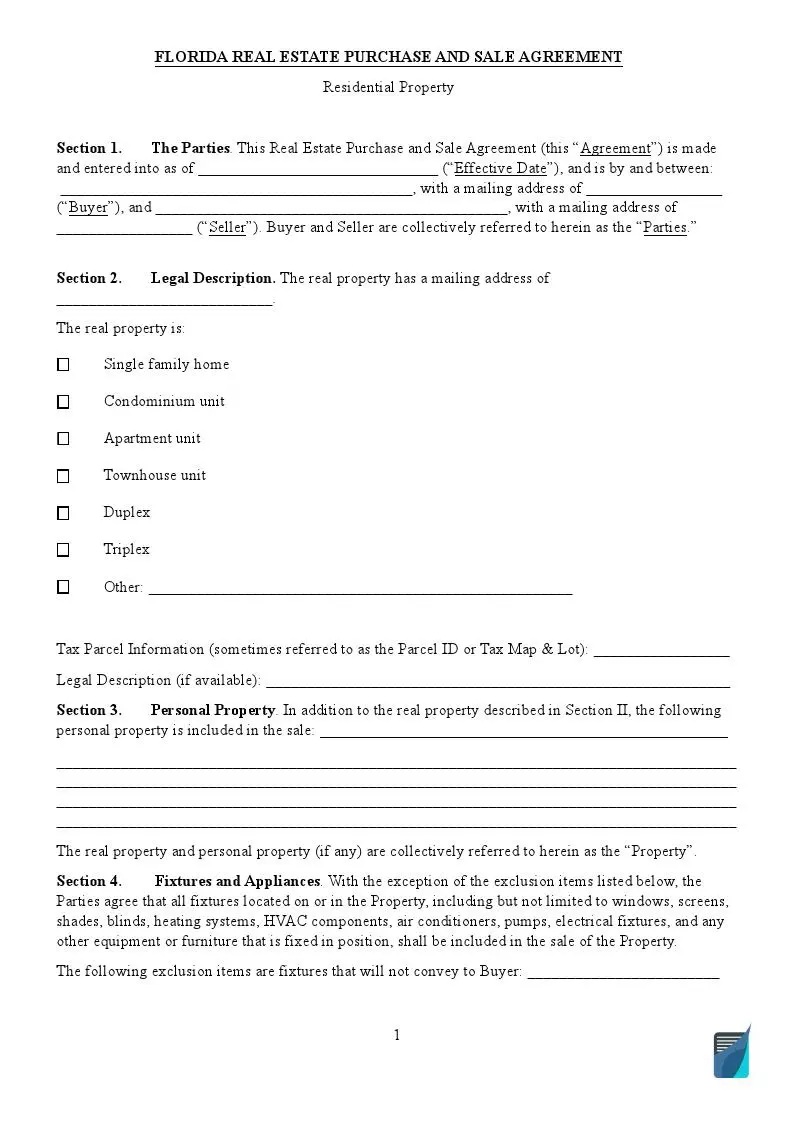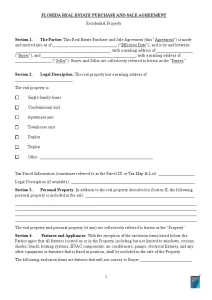Florida Real Estate Purchase Contract
Residents of Florida who intend to sell or acquire premises are empowered to enter a Florida real estate purchase agreement and establish binding relationships with the buyer. The focal purpose of the printable real estate sales contract is to provide guarantees to both parties and ensure the procedure is conducted under federal and state laws.
Real property contracts record the negotiated aspects, list the terms of the deal, and name guarantees. Once the purchase agreement is signed, it is challenging to void the document without violating the arrangements. In most cases, the party that initiates the unexpected termination becomes legally responsible and should cover the contingencies.
Besides defining how the transaction should be conducted, sale and purchase agreements often outline the earnest money amount. Earnest money is a guarantee that the potential buyer will not quit the deal abruptly. It is the primary means to ensure the seller of the purchaser’s intentions. Earnest money amount can add up to 3% of the purchase price and is not refundable.

Build Your Document
Answer a few simple questions to make your document in minutes
Save and Print
Save progress and finish on any device, download and print anytime
Sign and Use
Your valid, lawyer-approved document is ready
What to Include in a Florida Purchase Covenant?
Real estate agreements are free forms that any user can custom-tailor. We offer high-resolution PDF templates to generate and complete online via our software.
Florida sale and purchase documents distinguish agreements for commercial and residential property. Still, both types of papers share the contact components and cover the aspects defined below:
1. The seller’s and purchaser’s identities and mailing address, including the unit number, street, city, state, and ZIP details
2. The effective date of the agreement
3. The property type and its legal description. Florida recognizes the following premises types:
- Single-family houses
- Condo
- Duplex
- Triplex
- Planned Unit Development
- Commercial property
- Other
4. Purchase price and methods of payment
5. Earnest money rate
6. Closing details and responsibilities
7. Real estate condition
8. Entitling details
9. Disclosures
Some agreements contain space to enter the disclosure data. If not, the seller is allowed to attach the required documents.
10. Authentication—the parties’ signatures, current calendar dates, and legal names (printed)
Florida Residential Purchase and Sale Agreement
The contract defines the terms of ownership transfer regarding residential property. The paper aims to provide additional layers of security for both parties and guarantees that the buyer is satisfied with the condition of the premises. Once the contract is authorized, the parties can void the agreement only if both of them agree.
Florida recommends that the seller informs potential acquirers of the premises’ condition and current material damages. However, under the “buyer beware” status, the purchaser remains responsible for investigating the property. The current owners should also submit specific disclosures and attach them to the residential purchase and sale contract or reflect the data within the document.
Florida Commercial Purchase and Sale Agreement
Commercial property transfer involves more procedures and documentation. And though most aspects are similar to those reflected in residential property contracts, sellers who trade commercial premises prefer to hire third-party specialists to conduct the deal. Below are the disclosure forms prepared and submitted by agents in case the seller turns for licensed assistance:
- Single Agent Notice is regulated by §475.278(3) of the 2020 Florida Statutes and covers a list of duties the seller delegates to the licensee.
- No Brokerage Relationship Disclosure is regulated by §475.278(4) of the 2020 Florida Statutes. It contains the agent’s responsibilities if they are not involved in the brokerage association.
- If the licensed representative doesn’t have a definite status regarding the brokerage, the seller should submit the “Consent to Transition to Transaction Broker” form. The paper contains the agent’s legal name, duties, and the seller’s authorization details (signature and date).
Required Seller Disclosures in Florida
Florida is one of the U.S. states that support the “buyer beware” status. It implies that the purchaser is responsible for asking for the necessary information about the premises from the current owner. And though Florida advances that all sellers disclose a list of mandatory papers regarding the real property, the buyer should keep both eyes open and take responsibility to inspect the estate before appending their signature. Below is a list of the expected reports.
1. Lead-Based Paint Disclosure
All premises built before 1978 must be inspected for lead-containing components. Lead is a hazardous heath-threatening material. The seller is obliged to submit the required paper as per §4852d, Title 42 of the U.S. Code.
2. Seller’s Estate Disclosure (for Residential Property)
Florida statutes do not oblige, though highly recommend that the seller discloses information related to evident and hidden property damages known to the estate’s current owner. This disclosure protects both parties. It guarantees that the purchaser is aware of the objective condition of the obtained real property. The disclosure turns out to be helpful for the seller, as it releases them from liabilities after the contract is signed and the title is transferred.
3. Homeowners’ Community Disclosure Addendum
Following §720.401 of the 2020 Florida Statutes, the seller provides the related documentation to inform the purchaser that they have joined the homeowners’ association. This paper is needed if the buyer acquires common interests or condo property.
4. Condominium Association Disclosure
The documents explain the association’s regulations and basic rules. The seller should supply the disclosure to the purchaser before signing the contract for premises. The details can be learned from §718.503(2)(a) of the 2020 Florida Statutes.
5. Coastal Estate Disclosure Statement
If the premises are located in the coastal area, the seller should provide a specific statement as the estate may be subject to erosion and other unfavorable salt water-related effects. You are welcome to learn more from the corresponding paragraph 161.57 of the 2020 Florida Statutes.
6. Radon Gas Disclosure Statement
404.056(5) of the 2020 Florida Statutes explains that the seller should notify the buyer if the property is located in a radon gas area. The element becomes health-threatening and poisonous if it penetrates and accumulates indoors.
